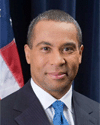Most States Will Choose a Governor in 2009-2010
While many people are focused on the midterm congressional elections
already, there are other elections in 2010 that may be even more important:
governors races in 36 states in 2010, as well as two more in 2009. These 38
races are especially important this cycle because the House will be
reapportioned after the 2010 census, which means that the gerrymanders will
crawl out from under their logs and bask in the sun briefly, as they always do once
in a decade. In nearly all states, congressional districts are set by law, which means the
state legislature gets to draw the district boundaries and then the governor
signs or vetoes the bill. If the legislature and governor are from the
same party, they can do pretty much whatever they want to and can be expected
to draw the boundaries to benefit their party. Of course, if
a state has only one representative, like Alaska, there is not much they
can do (although state legislative districts are still fair game).
But in a state like Florida, with 25 representatives now and
more expected after 2010, there is enormous potential for mischief.
On the other hand, if the governor's mansion and state legislature are
controlled by different parties, all bets are off. If the legislature comes
up with a one-sided plan, the governor will veto it. This pretty much forces
the legislature to limit its dreams. Typically, the result is a compromise
that protects all the incumbents and maintains the status quo, unless the
state gains or loses one or more representatives, in which case there is much
horse trading about the new boundaries, but the result can't favor the majority
party too much or the governor won't bite. With so many governorships up for
grabs this cycle, a dozen or more House seats hang in the balance.
Starting today, and over the course of the next few weeks, we will examine
all 38 races and point out some of the issues and potential candidates. Today's
installment is about New England, where all six states will choose a new
governor in 2010.
Maine
| Challenger | Challenger | Notes |

(D)
|

(R)
|
Open seat. Gov. John Baldacci (D-ME) is term limited, giving the Republicans
a shot in this once strongly Republican state. However, they don't have a
lot of potential candidates. While both senators are Republicans, it is
doubtful that either one wants the job. Both representatives are Democrats.
Most likely, a state legislator or rich businessman will get the
nomination. It may not be worth that much, however, since the the state
is quite blue and the only way senators Susan Collins and Olympia Snowe
stay in the saddle is by bucking their own party much of the time. A
possible Democratic candidate is Attorney General Steve Rowe, who is
definitely interested, but other Democrats may jump in as well.
One wild card is the possibility of an independent governor; two of the past
five governors have been independents.
|
New Hampshire
| Incumbent | Challenger | Notes |

John
Lynch
(D)
|

(R)
|
If Gov. John Lynch (D-NH) wants a fourth 2-year term, there is nothing
the Republicans can do do stop him. He won his first three elections in
landslides and the state is bluer than ever. Their only hope is that he
retires. He has already said he is not running for the state's open
Senate seat. The Republican bench in New Hampshire is extremely thin.
There is a small chance that former senator John Sununu will run, but
most likely he won't unless Lynch retires.
|
Vermont
| Incumbent | Challenger | Notes |

Jim
Douglas
(R)
|

(D)
|
Vermont is one of the Republicans' few bright spots in New England.
If four-term governor Jim Douglas (R-VT) runs for a fifth two-year term, he'll
probably win, despite his party label and the fact that Vermont is an
extremely blue state. In most southern states he'd be too far to the
left to get the Democratic nomination, let alone the Republican one,
but Vermonters like him just fine. The Democratic bench is deep here, and
former lieutenant governor Doug Racine, Secretary of State Deborah Marowitz,
and Treasurer Jeb Spaulding may end up battling it out for the Democratic
nomination. In addition to having to deal with Douglas' personal popularity,
another problem the Democrats have here is the very possibility of an
independent candidate running to the left of the Democrat. In 2008,
Anthony Pollina ran as an independent and got more votes than the Democrat.
He is thinking of running again. Of course, if Douglas decides the retire,
the picture will change radically as the Republicans have no backup.
|
Massachusetts
| Incumbent | Challenger | Notes |

Deval
Patrick
(D)
|

(R)
|
Gov. Deval Patrick (D-MA) is the nation's second elected black governor.
Despite a mediocre performance and low approval ratings if he decides
to run for reelection--and there is no sign he won't--he will win easily
because there are simply no credible Republicans in Massachusetts.
In theory, former governor Mitt Romney (R) could run again, but he has
other fish to fry and he moved so far to the right during the Republican
primaries of 2008 that he would probably lose anyway.
And Patrick can count on his good friend Barack Obama to help him in any
way he can. Patrick's only worry is a primary challenge from a fellow
Democrat, possibly state Treasurer Timothy Cahill.
|
Rhode Island
| Challenger | Challenger | Notes |

(R)
|

(D)
|
Open seat. Term-limited Gov. Don Carcieri (R-RI) has to call it quits
in 2010 and whichever Democrat wins the primary will be the heavy
favorite in the general election. The Democratic bench is deep here,
with Attorney General Patrick Lynch, Treasurer Frank Caprio, and
Lt. Gov. Elizabeth Roberts all mulling over their chances. The
Republicans have nobody of note available and will probably have to
settle for a former state legislator or a rich businessman as the
sacrificial lamb in this extremely blue state. The only wildcard
would be the possible entry of former senator Lincoln Chafee as an
independent.
|
Connecticut
| Incumbent | Challenger | Notes |

Jodi
Rell
(R)
|

(D)
|
Connecticut is the Republicans' second bright spot in New England (after
Vermont). If Gov. Jodi Rell (R-CT) runs for reelection, she will almost
certainly win. There is a small chance she might challenge Sen. Chris Dodd (D-CT),
but why would she give up near certain reelection for a long-shot chance
at upsetting a five-term senator? The most likely Democrat to run against
Rell is Secretary of State Susan Bysiewicz, but she may have to get through
a primary first.
|
If you like this Website, tell your friends. You can also share by clicking this button

-- The Votemaster
|
Your donation is greatly appreciated. It will buy ads to publicize the site.

|





